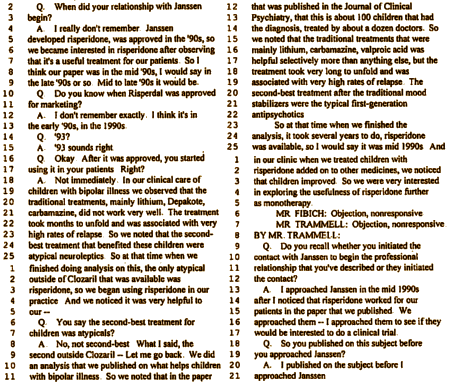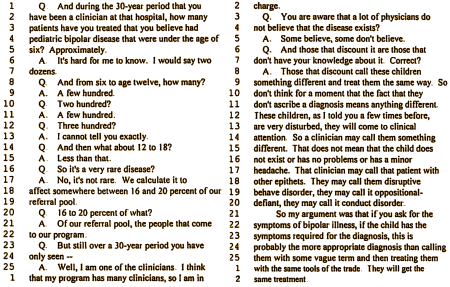But if you think about it, what does the result of a Risperidone Trial in disruptive retarded kids have to do with bipolar disorder in children, even if it had shown what they claimed [which it didn’t]? Stay tuned…

Janssen didn’t bite, so Biederman did a study with Olanzapine in bipolar children. After Janssen failed to get approval for Disruptive Behavior Disorder, they did respond to Biederman – funding his J&J Center for Pediatric Psychopathology Research in 2002. He paid them back, by my reckoning, by signing on as an author to a a presentation at the 2002 AACAP Meeting [later published in 2006]. It’s the revived old study from a 1998 Trial of Risperidone in Disruptive Retarded kids – the one I’ve been ranting about as the bad penny. Besides the fact that he had nothing to do with that study, that it was ghost-written by Excerptia Medica, and that it had an error that dramatically fudged the results, there was something else to say about it. He was using a study of Disruptive Behavior Disordered kids to say something about the effect of Risperidone on kids with Bipolar Disorder. Did he think they were Manic? He didn’t say that. He just said it was good for symptoms affective and otherwise [best for otherwise]. There’s nothing bipolar specific in what he says.

While I have some empathy with this feeling, it has nothing to do with bipolar disorder or with Rebecca Riley. So he’s saying this in an interview about a kid who probably wasn’t sick in the first place! Had Rebecca Riley been called Disruptive Behavior Disorder rather than Bipolar, maybe the psychiatrist would’ve insisted on observing the child more and realized that the disease was in the parents – not the child [in tears and despair…].
So that’s why I’ve been so obsessed with Dr. Biederman’s bad penny study. He didn’t do the study, nor write the abstract, he probably didn’t write the article [and one wonders if he’d even read it]. But that aside, he published a study that says he’s using Risperidone because it calms down disturbed, out-of-control kids. That doesn’t make them bipolar. Their symptoms don’t say bipolar. Their response to medications used in bipolar disorder in adults doesn’t say bipolar. So what he did was to join Janssen’s campaign to make it easier to prescribe their drug to kids for behavior control [trial 93: a very bad penny…], whether that’s what he thought he was doing or not.
What difference does it make? It’s huge. I want psychiatrists who see very disruptive kids to have to agonize over every prescription they write for big time medications just like I have to. I want them to be sure about those "tears and dispair." I want them to spend time with the kid. And in those cases that come along where they do use these medicines, I don’t want them to be able to kid themselves that they’re treating some disease that they understand. And I guarantee that they won’t be routinely prescribing Atypical Antipsychotics to children irresponsibly, because justifying that use of medicine in court requires a lot of documentation. You need to be able to prove that the alternatives are worse – short term and long term.
Thank you for your 2nd toward last paragraph. That got me choked up and I want to thank you on behalf of my daughter, who would be a different person today if doctors did what you say re antipsychotics.